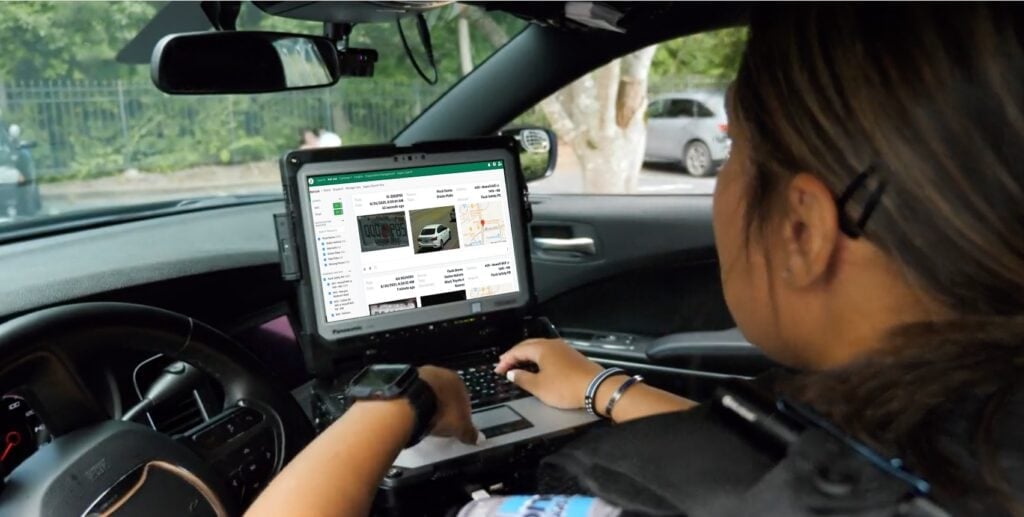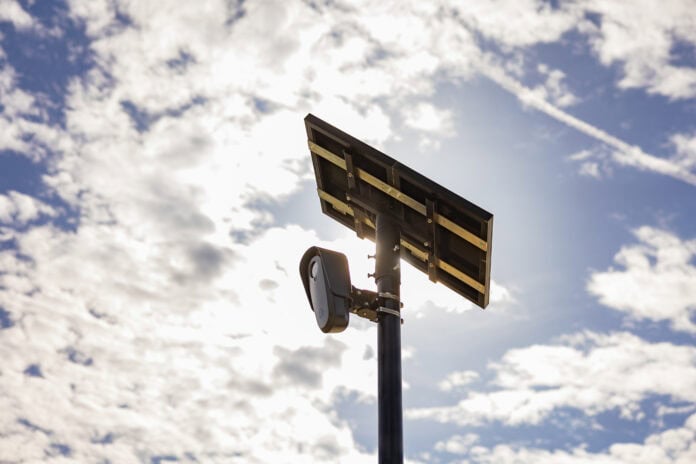MIDLOTHIAN – A recent vote in the City of Midlothian to allow the police department to install Flock Cameras, defined as license plate recognition (LPR) cameras used by law enforcement and for private use to help fight crime, has some residents in Ellis and Dallas County questioning if this is one step closer to Big Brother.
While the media representatives at Flock Camera didn’t return emails with questions about the cameras and privacy, at Flocksafety.com, the company’s narrative is “License plate readers play a critical role in the national crime and safety conversation. This is true especially as communities, businesses, and public safety institutions increasingly rely on technology to drive insights to generate leads and solve and prevent criminal activities.”
Indeed, there have been increasing questions about these cameras being placed in communities. However, a quick survey led me to the conclusion that just about every PD in the area uses Flock, whether residents are aware of it or not. Midlothian’s City Council was just catching up with other PDs when they approved the city’s Flock Camera installation.
The American Civil Liberties Union opposes Flock Cameras, according to their website, “Working with police departments, neighborhood watches, and other private customers, Flock not only allows private camera owners to create their own “hotlists” that will generate alarms when listed plates are spotted, but also runs all plates against state police watchlists and the FBI’s primary criminal database, the National Crime Information Center (NCIC). Flock’s goal is to expand to ‘every city in the United States,’ its cameras are already in use in over 2,000 cities in at least 42 states.”
Ellis County’s State Representative Brian Harrison is also not fond of the Flock Camera idea. During the last session, he filed HB 3999 to restrict the use of these license plate readers.
The bill, which was assigned to the Homeland Security & Public Safety, did not pass and did not even have a hearing in committee.
Harrison tweeted, “Governments should not be able to spy on you without a warrant. I’m proud to have filed #HB3999.”
He said, “I have a real concern about an unholy marriage between big government, big tech, and the surveillance state, and I think all Americans who cherish their civil liberties should. I appreciate local governments working to keep citizens safe. However, if they want to use these tools to collect data on innocent citizens, I believe they should get a warrant. I was proud to file a bill during the last session to require that and will re-file it again at the next session.”
Midlothian Police Chief Carl Smith said, however, that he can disable the Flock Cameras at any time, so in that respect, the cities and PD’s do have the power if it were ever needed.
In that regard, Chief Smith and his department, like most police chiefs in the area, are not worried about these cameras taking on a surveillance life of their own since they have the final say.
And, for those wondering, the license plate data is typically deleted after 30 days and purged from the Flock Camera system.
A real benefit for the Midlothian residents after their City Council voted to approve Flock Cameras a few weeks ago is that the council took the time to add to the approval the creation of a subcommittee made up of three council members to oversee the new system.
Midlothian Mayor Justin Coffman said, “As a caveat to approving the purchase of Flock Safety License Plate Reader products and services, Midlothian City Council voted to appoint a subcommittee to oversee the new system. To me, the addition of the subcommittee was appropriate to address some of the questions that were raised about how the use of the system would be audited. As representatives of the public, Council wants to be assured that the private information of individuals remains protected while at the same time equipping our law enforcement officers with the tools they need to protect citizens’ lives and property.”
In Ellis County, several cities in addition to Midlothian, use the Flock Camera, including Red Oak.
Red Oak Police Chief Garland Wolf said “These systems work in concert with law enforcement as a force multiplier being another set of eyes. They can monitor major points of ingress and egress from neighborhoods or heavily traveled thoroughfares and assist officers with locating vehicles that are stolen or used in violent crimes such as robberies or aggravated assaults.”
Wolf explained that while the cameras do search regional databases for activity such as traffic warrants, which is rarely the focus of a patrolling officer receiving a Flock camera hit.
“They can also assist us in locating vehicles associated with AMBER and SILVER alerts,” he explained. “This information is also shared amongst law enforcement agencies so if a particular crime is being committed in a town close by that has a specific vehicle description it might show up on a Flock Camera being utilized in our jurisdiction meaning that crime may have migrated to our city. By far these cameras are of more value than detrimental to the community as previously stated they are a force multiplier.”
Wolf did acknowledge there are concerns from citizens about big brother watching and collecting data.
“I believe that in most cases that scrutiny is warranted, and every citizen should be concerned about infringement of civil liberties,” he said. “However, with the case of Flock Safety they never record names, phone numbers, or addresses and doesn’t mark specific locations where people have been. There is no capability in the system to mark or annotate the locations of passersby. This product has been very valuable to the Red Oak Police Department in helping us identify and develop probable causes of certain types of crimes. Its biggest benefit to us has been its usage in the solving of major crimes. In an era of reduced budget lower manpower and the challenges of hiring and maintaining officers, this technology is a game changer and, as previously stated, a force multiplier.”
As Chief Wolf explained, the data or photos captured do not track; they merely capture images at fixed locations for routes traveled.
“One thing that should be noted is the system is designed to remove or reduce human bias for solving crimes,” Wolf said. “An example is on a specific date at a specific time a vehicle matching a specific license plate was seen on a camera in this area matching both plate and physical description of a vehicle used in an aggravated assault and robbery. It was seen on cameras in several cities and locations, but it is put at the scene of an offense for which this jurisdiction is responsible. It gives law enforcement a starting point to formulate or postulate theories, timelines, and other probable causes to obtain warrants. The cameras are just a tool to provide real-time data.”
Another question that often comes up is whether an officer can run plates for no reason, e.g., for Flock Camera surveillance and beyond.
Chief Wolf said, “Yes, police can legally run vehicle license plates without a specific reason. The U.S. Constitution’s Fourth Amendment protects against unreasonable searches, but license plates, being in plain view on public roads, don’t have an expectation of privacy. Therefore, running a plate doesn’t constitute a “search.” It is really no different than us running a license plate on our computer in our car. This process has just been automated. Because license plate readers do not collect information on who is driving or riding in the vehicle, it is not considered Personally Identifiable Information (PII).

The LPR cameras take still images of cars passing through the lens (not video) and cannot follow or track vehicles once they leave the camera’s view.”
As explained by Chief Wolf, “When we receive a Flock Camera hit we still have to take the image of the license plate and run it through TCIC/NCIC or more specifically Texas Crime Information Center or the National Crime Information System which is managed by the department of public safety and requires training and licensing to use and abuse of such systems results in a removal or authorization for that user and monetary sanctions and criminal charges against the user and agency employing that individual.”
Chief Smith added, “We have been watching this technology for several years now, and we felt comfortable at this point because of how Flock treats the data and knowing we have more control. We have a log of what our officers are doing, and there is going to be a proactive view of that to whatever extent our subcommittee feels comfortable.”
He said he is sure his department will get “good work out of this, and the scrutiny is worth the effort.”
Chief Smith also concluded that the Flock Camera software does not collect personal identifying information (PPI), which many people are concerned about regarding too much surveillance.
He concluded, “The Flock Camera software only takes a photograph of the license plate, therefore assuring a person’s PPI is never compromised.”














